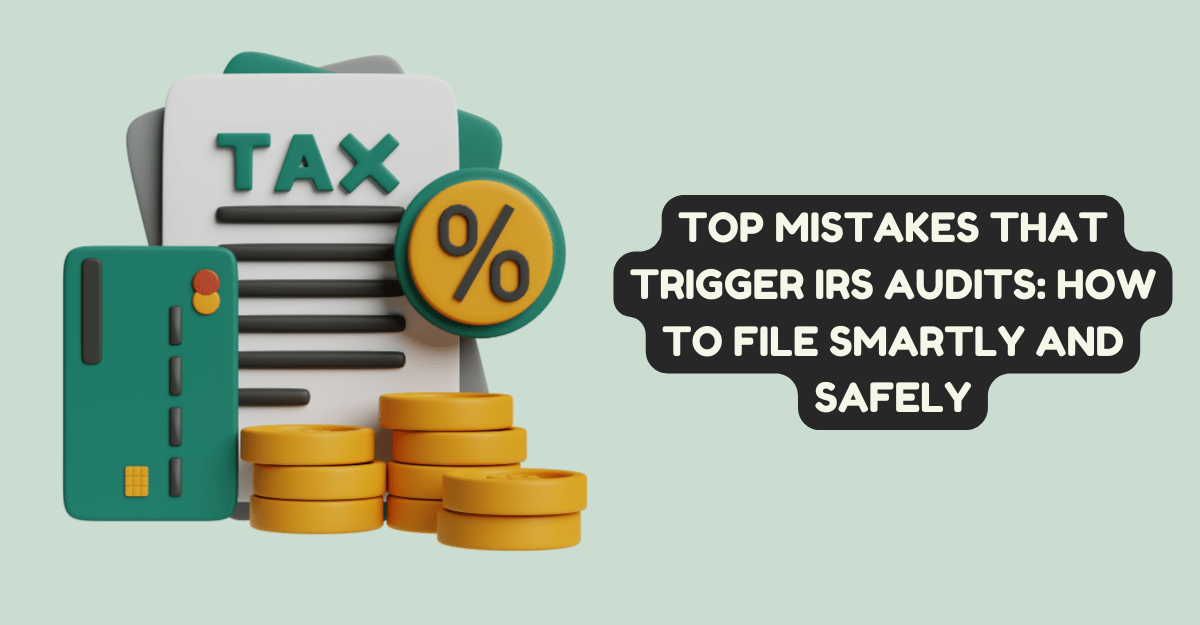
Top Mistakes That Trigger IRS Audits: How to File Smartly and Safely
Navigating the labyrinth of tax season requires more than just diligence and honesty; it demands a keen eye for detail and a deep understanding of tax laws. The Internal Revenue Service (IRS) has sharpened its focus on accuracy and compliance, transforming tax filing into a tightrope walk where even minor missteps can trigger an audit. For many, the thought of an IRS audit is fraught with anxiety, conjuring images of endless paperwork and potential financial strain. However, understanding the top mistakes that invite IRS scrutiny is the first step toward filing smartly and safely, safeguarding your financial well-being against the specter of audits.
This guide isn’t just about avoiding pitfalls; it’s a blueprint for navigating tax season with confidence. It delves into common filing errors, from underreporting income to misunderstanding deductions, each of which could inadvertently draw the IRS’s gaze. But more importantly, it offers sage advice on how to sidestep these errors, ensuring that your journey through tax season is as smooth and stress-free as possible.
Inaccurate Income Reporting: A Red Flag for the IRS
At the top of the list for IRS audits is inaccurate income reporting. Whether it’s an honest mistake or an intentional omission, failing to report all your income is a surefire way to attract unwanted attention. This includes all forms of income, from W-2s and 1099s to foreign earnings and freelance payments. Ensuring that every dollar is accounted for, cross-referencing documents and double-checking entries can keep you off the IRS’s radar.
Understanding the Importance of Accurate Deductions
While claiming deductions can significantly lower your tax bill, overstepping in this area can lead to an audit. This is where many encounter Form 4549, a summary of proposed changes by the IRS after an audit, often stemming from discrepancies in deductions. To avoid adjustments and the potential for penalties, document and justify every deduction with clear, compelling evidence. Meticulously maintaining receipts and records is not just good practice; it’s your best defense in the audit process.
The Perils of Home Office Deductions
The home office deduction is a boon for freelancers and remote workers, yet it’s also riddled with complexities. The key to claiming this deduction without triggering an audit is strict adherence to IRS rules. The space must be used regularly and exclusively for business, and the deduction amount must be calculated correctly. Blurring the lines between personal and professional use can quickly lead to complications with the IRS.
Charitable Contributions: Documentation is Key
Generosity pays off, not just in good karma but in tax deductions, too. However, when reporting charitable contributions, thorough documentation is essential. The IRS requires receipts for any donation over $250, and for contributions in kind or donations valued over $500, additional forms and appraisals may be necessary. Exaggerating the value of donated items or failing to maintain proper records can flag your return for an audit.
Risky Business: Reporting Losses Year After Year
Operating a business at a loss can sometimes be part of the entrepreneurial journey. However, reporting losses year after year raises a red flag for the IRS, suggesting your “business” might not be a genuine commercial endeavor. To avoid scrutiny, ensure your intention to make a profit is clear, keeping detailed records of business activities, expenses, and efforts to turn the business around.
Misusing the Earned Income Tax Credit
The Earned Income Tax Credit (EITC) is a boon for low-to-moderate-income families, yet it’s frequently audited due to high rates of incorrect claims. To avoid errors, ensure you fully understand the eligibility requirements. Misreporting income, filing status, or the number of dependents can inadvertently lead to claiming the EITC incorrectly. Always double-check your qualifications before claiming this credit.
Failing to Report Foreign Bank Accounts
With the IRS intensifying efforts to clamp down on offshore tax evasion, failing to report foreign bank accounts can lead to severe penalties. If you have foreign accounts exceeding certain thresholds, you must file a Report of Foreign Bank and Financial Accounts (FBAR) alongside your tax returns. Neglecting this requirement can make you a prime candidate for an audit.
Overlooking the Affordable Care Act Provisions
The Affordable Care Act (ACA) introduced several tax implications for individuals and businesses. Not adhering to the coverage requirements or incorrectly calculating the Premium Tax Credit can trigger an IRS audit. Ensure you’re aware of how the ACA affects your tax situation, particularly if you’re self-employed or do not have employer-sponsored health insurance.
Math Errors and Computational Mistakes
Simple math errors or computational mistakes on your tax return are easy for the IRS’s automated systems to detect, often leading to an audit or at least a review. Before submitting your tax return, double-check all numbers and calculations or consider using tax preparation software to minimize errors.
Filing Status Errors
Choosing the wrong filing status can significantly impact your tax liability and the credits you’re eligible for. Whether it’s misunderstanding the qualifications for “Head of Household” status or mistakenly filing as “Single” when “Married Filing Separately” is more appropriate, such errors can attract IRS scrutiny. Understand the criteria for each filing status to ensure you make the correct choice.
Accurately selecting your filing status is crucial as it influences your standard deduction amount, tax rate, and eligibility for various deductions and credits. It’s a fundamental aspect of your tax return that sets the foundation for how your taxes are calculated, so taking the time to review and choose the most beneficial status based on your circumstances can lead to significant financial advantages.
Conclusion
Steering clear of these common mistakes can markedly reduce your chances of facing an IRS audit. The golden rules are straightforward: report all income, claim only the deductions and credits you’re entitled to, and meticulously maintain your records. Remember, the goal isn’t just to avoid audits but to fulfill your tax obligations accurately and confidently. In the fast-changing landscape of tax regulations, staying vigilant, informed, and seeking professional advice when in doubt can be invaluable. Whether you’re a seasoned taxpayer or navigating your first tax season, embracing these principles ensures you’re prepared for whatever tax season throws your way. After all, smart and safe filing is about peace of mind, knowing you’ve managed your tax responsibilities with diligence and care.






